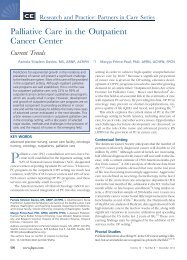social work practice and the law - Springer Publishing
social work practice and the law - Springer Publishing
social work practice and the law - Springer Publishing
You also want an ePaper? Increase the reach of your titles
YUMPU automatically turns print PDFs into web optimized ePapers that Google loves.
10 Social Work Practice <strong>and</strong> <strong>the</strong> Law<br />
dilemmas for judges who must remain impartial <strong>and</strong> unbiased yet must do<br />
everything in <strong>the</strong>ir power to provide clients with a fair hearing (Office of <strong>the</strong><br />
Deputy Chief Administrative Judge for Justice Initiatives, 2005). Given <strong>the</strong><br />
kinds of cases, such as eviction <strong>and</strong> domestic abuse, clients may also be in<br />
crisis or experiencing traumatic stress in ways that fur<strong>the</strong>r interfere in <strong>the</strong><br />
level of cognitive <strong>and</strong> <strong>social</strong> functioning required for effective advocacy<br />
in court.<br />
WHY CLIENTS DO NOT ALWAYS ACCESS AND VIEW THE<br />
LEGAL SYSTEM AS HELPFUL<br />
It is important for <strong>social</strong> <strong>work</strong>ers to underst<strong>and</strong> <strong>the</strong> reasons as to why <strong>the</strong> legal<br />
needs of clients go unaddressed <strong>and</strong> why clients do not enforce <strong>the</strong>ir rights.<br />
Reasons for not addressing legal concerns at <strong>the</strong> client level include: lack of<br />
knowledge about legal rights <strong>and</strong> entitlements, lack of access to legal professionals,<br />
low literacy, physical or mental disability, isolation, apprehension<br />
about <strong>the</strong> courts <strong>and</strong> legal system, sense of stigma, <strong>and</strong> self <strong>and</strong> o<strong>the</strong>rs’ prior<br />
experiences with <strong>the</strong> legal system that discouraged participation (Legal<br />
Services Corporation, 2009). These reasons suggest that clients believe <strong>the</strong>re<br />
are both <strong>social</strong> <strong>and</strong> psychological costs associated with accessing <strong>and</strong> taking<br />
up <strong>the</strong>ir rights <strong>and</strong> entitlements (Hernanz, Malherbet, & Pellizzari, 2004).<br />
Clients in <strong>the</strong> state surveys also expressed that taking up <strong>the</strong> rights <strong>and</strong><br />
benefits <strong>the</strong>y were entitled to was just “too much hassle” (Legal Services<br />
Corporation, 2009). This speaks to “transaction costs” <strong>and</strong> refers to modes of<br />
operation in government agencies such as intrusive policies <strong>and</strong> procedures,<br />
disrespectful interactions that clients endure, stigma, <strong>and</strong> <strong>the</strong> administrative<br />
obstacles <strong>the</strong>y face as <strong>the</strong>y attempt to activate <strong>the</strong>ir legal rights <strong>and</strong> entitlements<br />
(Lens & Vorsanger, 2005; Weiss-Gal & Gal, 2009).<br />
Social <strong>work</strong>ers are sometimes part of <strong>the</strong> reason that clients do not access<br />
<strong>the</strong> legal system or underst<strong>and</strong> its potential as a helping system. Social service<br />
providers’ lack of knowledge that a client problem was a legal one, which<br />
could be solved legally <strong>and</strong> <strong>the</strong>refore insufficiently connecting clients to<br />
legal resources, is identified as one of <strong>the</strong> reasons clients do not access legal<br />
services (Legal Services Corporation, 2009). This is a crucial point because<br />
low-income clients are far more likely to have interactions with community<br />
<strong>and</strong> <strong>social</strong> service providers than legal services.<br />
In a study conducted by Braye <strong>and</strong> Preston-Shoot (2006a) investigating<br />
what service users expected from <strong>the</strong>ir <strong>social</strong> <strong>work</strong>ers with regard to<br />
legal knowledge <strong>and</strong> skills, <strong>the</strong> authors report that clients want <strong>and</strong> need<br />
<strong>the</strong>ir <strong>social</strong> <strong>work</strong>ers to know <strong>the</strong> <strong>law</strong> <strong>and</strong> to know how to interact effectively<br />
with <strong>the</strong> legal system. A persistent complaint identified by <strong>the</strong> clients was<br />
that <strong>social</strong> <strong>work</strong>ers claimed to know <strong>the</strong> <strong>law</strong> but often did not, <strong>the</strong> results<br />
being that clients were misinformed. Fur<strong>the</strong>r, clients note that <strong>social</strong><br />
<strong>work</strong>ers’ lack of knowledge about <strong>the</strong> <strong>law</strong> made <strong>the</strong>m less effective<br />
<strong>and</strong> credible when <strong>the</strong> <strong>work</strong>ers were engaged in legal proceedings (Braye &<br />
Preston-Shoot, 2006a). At <strong>the</strong> same time, clients wanted <strong>social</strong> <strong>work</strong>ers<br />
to think proactively <strong>and</strong> positively about <strong>the</strong> <strong>law</strong>, so that <strong>social</strong> <strong>work</strong>ers
















